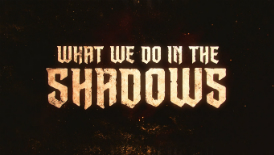School’s out, and everybody wants to see the Great Old Ones: the line into the Miskatonic Zoo doubles back and winds out the gates. The American and Massachusetts flags barely flutter above the gate, and the sun today is merciless in a cloudless sky. I ask my grandchildren, Caleb and Cody, if they wouldn’t rather go to a museum or park, catch a ball game, or go anywhere at all less crowded, but they won’t be swayed. The zoo has been closed for renovations for two years now, and they want to see the Great Old Ones in their new, “natural” habitats.
It was originally built as a prison. It looked the part even when they opened it to public tours, back when I was a baby. It hadn’t done much to change its look in the last 70 years. I’m almost as curious as my grandkids. I’m old enough to have seen America stumble toward evolved attitudes on many things, and the Old Races are a good example. It always starts with fear. Horrors lurking in the dark. And then something shines a light on that fear, and once we see it, we can face it, fight it, drag it into the sunshine, and conquer it. And once we’re not afraid anymore, we can afford to be generous. We make accommodations. We give the object of our fear a place in society—as long as it can never threaten us again. So now the prison for monsters has become a habitat for exotic animals. It happened in a generation.
There is news footage of me, from when I was three, at the newly renamed Miskatonic Zoo. My parents stood behind me, and I toddled up to the thick pane of glass, behind which, under bright lights, was a Shoggoth as big as a moving van. In the footage, I slapped my chubby hands on the glass, and the Shoggoth’s pseudopods shot out and flattened against the barrier, eyes and tendrils forming and dissolving in a frenzy. I laughed, and the camera zoomed in on my innocent delight. The footage was played and replayed. I won’t take credit for changing the attitude of a nation, but I was in an image representing that change. Even today, my claim to minor fame is as “that baby laughing at the Shoggoth.”
From our place in line, we see a metal stair leading to a platform, just inside the gate. A Shoggoth waits under the platform while groups of visitors climb into the howdah on its back. That’s new. A teenage kid in a Miskatonic Zoo uniform shouts something inaudible, and the Shoggoth slowly flows down one of the paths, pausing to let families with strollers pass. Another Shoggoth shambles up to the platform to receive the next riders. Our scientists learned the command language from the Elder Things, at least enough to make the creatures useful. It looks like we’ve progressed since then. They say the Shoggoths started as the Elder Things’ slaves. Now they’re ours. We keep the Elder Things well away from the Shoggoths, of course. Fool us once, et cetera et cetera.
The kid at the counter waves me and the boys through the entrance without taking my credit card, saying “Welcome back, Mister Holyoke!” There is—or was—a screen inside the receiving lobby playing the footage of the three-year-old me with the Shoggoth. They use it in the Visitors Center introductory video too. I can see that Chris and Cody enjoy the conferred status from being with me. I admit it makes me stand a little taller too. It’s the little things, at my age.
The park has changed considerably. Habitats constructed to be “more suitable for the animals’ health and well-being” is a newer concern. Miskatonic now has a school of marine biology as well as zoology, and where once the research was geared toward how to contain these creatures, now it’s about their ecology, physiology, and health.
The Deep One house is completely new. Before, it was a bare, concrete-and-glass enclosure with a cement floor and a murky pool, more for wading than swimming. The fish-men wore collars and cuffs, and the males were locked into kilt-like garments after complaints that visitors were disturbed by the size of their genitals. Now they are unshackled, and let it all fly free. In the lobby there’s an information mural, and an educational video featuring a popular actress, about Deep One reproduction and interbreeding, which doesn’t shy away from the dark history of sexual assault before the species and their half-breed descendants were rounded up. The new, two-level habitat has a facade replica of decrepit Innsmouth buildings and piers, and even an artificial reef some distance off the “shore.” The water’s depth is four or five times the height of an adult, and the bottom is decorated with sea grasses, replicas of sunken ruins, broken columns, and various small, bottom-dwelling marine creatures.
I can’t help but feel that the enriched enclosure is mostly for the benefit of the zoo visitors. The Deep Ones sit as they always had, huddled in small groups on the pier or on the reef, as though they were still shackled together. They stare at nothing, pointedly ignoring all the kids tapping on the glass. As we watch, one of the reef-sitters rolls into the water and paces the tank, as far back from the glass as possible. Back and forth it swims, traveling end to end in seconds with the barest flick of its webbed fingers and toes.
“Stop it, boys,” I say to Chris and Cody, who have joined the other knockers.
“But Grampa,” Cody says. “You did this, and now you’re famous!”
“Just stop bothering the poor thing.” Poor thing. I guess I’m part of the shift. There are no half-breeds in the zoo anymore—I’m not sure what was done with them—but the way these creatures sit in their little circles, not seeming to communicate or do anything, ignoring the constant clamor of children, their bulging eyes staring at nothing and their plump, fishy lips in a permanent “O” of surprise—well, it’s disturbing. I dislike seeing apes in captivity too. A little too human for comfort.
I know I’m projecting. I’m retired, and my main occupation now is keeping my grandchildren occupied while their parents are at work. Otherwise, I do a lot of sitting in silence too, everything behind me, not much ahead.
At the far end of the underwater viewing deck, a sign above a bank of elevators reads “To Father Dagon.” The Shoggoths, Elder Things, Deep Ones, ghouls, nightgaunts, and the fungi from Yuggoth are one thing, but people come to the Miskatonic Zoo to see the colossal Great Old Ones. The zoo houses two of the three “gods” of the Deep Ones—the third, Mother Hydra, is the main attraction in the Stockholm aquarium. Chris and Cody each take an arm and pull me to the elevators. The elevator car’s far wall is glass, and etched into it is a design like the veins of a leaf. An Elder Sign. The Sign is stamped somewhere into all the enclosures, but are most obvious surrounding the Great Old Ones. How they work is still being studied. But they do work. They were the key to keeping the creatures under control.
The elevator slowly descends a concrete shaft while overhead audio describes Father Dagon: how he was captured, his diet, the genetic similarities to the Deep Ones, and evidence for and against him being a mature organism of the same species.
Dagon was the first of the Old Races humanity faced head-on. When he attacked an oil drilling rig, it drew the Great Old Ones out of the shadows and into conflict with American interests. It was just what the nation needed: a monster to target with its military machine, the cost of which was becoming harder to justify to the American people. We uncovered conspiracies, rounded up cultists, weaponized their eldritch lore, and hunted down monsters wherever they lurked. It created jobs, stoked national pride, and returned America to global relevance.
Finally the concrete gives way to the blue-green lighted waters of the tank. Unlike the Deep One enclosure, this tank is unadorned, and massive chains attached to enormous eyebolts in the walls descend into the depths. We see the top of Dagon’s spiny head first. Great spikes webbed with fins crown his head and descend in rows down his muscled back. The elevator sinks slowly, putting us at the level of his huge, bulbous eyes and shark-toothed maw, big enough to swallow the entire elevator car. An Elder Sign-studded collar, just beneath his gill slits, is attached by chains to the walls, keeping the Great Old One immobile.
The elevator pauses so everyone can pose in mock terror for photos.
Then the elevator continues, giving us a full view of all 20 yards of his serpentine body and webbed limbs. Dagon is chained at several points to the wall, and his tank offers little room to move anyway. I’d read there are already protests. Animal rights activists compare Dagon’s captivity to how veal is raised, and there is speculation that the creature might even be sentient. Serious academics use the word “genocide.” And yet I think this manner of holding him seems somehow more respectful. It acknowledges the giant, ancient creature’s power, the threat he could pose.
Then I see the divers. Marine biology students are swimming in the tank, taking scale samples, drawing blood, and scraping parasites from Dagon’s body. Dagon isn’t being shown respect.
He’s being studied.
The elevator reverses direction at the beast’s clawed, webbed feet. During its slow ascent, I stare at Dagon, trying to see the sanity-splitting horror it once was. It is freakishly huge. It has an as-yet inexplicable sensitivity to a particular glyph. But other than that… “Poor thing” indeed.
“Can we see Cthulhu now?” Cody says, just as Chris says “Shoggoth ride!”
The schedule decides it. The next Cthulhu showing is in 20 minutes, so we make our way to the R’lyeh Amphitheater, hurrying past the touch-and-learn displays of non-Euclidean geometry so we can get “good” seats in the splash zone. The amphitheater dominates the zoo campus. A semicircle of concrete steps provides seating for hundreds, and before it rises an artful jumble of greenish masonry blocks glistening in the sun. They feature the same eye-twisting angles and planes from the touch-and-learn exhibit. In the middle of that jumble is the monolith, a darker block of stone as big as a medium-sized office building. It is carved, bottom to top, with an Elder Sign. Floodlights and fog machines set an eldritch, otherworldly atmosphere. The renovation added drama to the show. In past years, Cthulhu was kept in a tank like Dagon’s.
At noon on the dot, the fog machines belch out a dense cloud of vapor, and the floodlights cycle from green to blue to red. A deep male voice booms from hidden speakers, somehow wringing torturous Aklo words through a New England accent. “Ph’nglui mglw’nafh Cthulhu R’lyeh wgah’nagl fhtagn.” A beat later, a woman’s voice translates. “In his house in R’lyeh, dead Cthulhu waits dreaming.” Applause. Ominous music builds as the fog cloud clears, and then the monolith splits down the middle, the two halves slowly separating. Black smoke pours forth. Then, to the screams and cheers of the audience, Great Cthulhu scrambles out onto the masonry.
Everyone has seen the videos. We all know what he looks like. The octopus head, the dragon wings, the soggy, semi-gelatinous flesh in a manlike shape. He lurches forward, tentacles waving, arms reaching, straining vainly against the enormous shackles that confine him to the stage. Still, his sheer size makes him impressive. If allowed to stand erect, he would dwarf even the monolith.
“What’s that thing on his head?” Chris asks me.
A metal band fits Cthulhu like a crown, but from certain angles you can see that it is held in place by prongs piercing his glob of a cranium. “That’s so he keeps his dreams to himself,” I answer. Cthulhu is the first truly psychic organism studied by biologists and neuroscientists. The research to block his madness-inducing thoughts yielded interesting side discoveries, and mind-to-mind communication among humans is now discussed as a real possibility, with revolutionary consequences.
Cthulhu screeches and blubbers as he strains against his bonds. But they are so obviously secure, that the initial shock of his charge gives way to quiet contemplation of this huge, alien organism. There is no more drama. The rest of the show is devoted to the science, including his disabled telepathy, his not-quite-solid tissue structure, and his probable extraterrestrial origins. His human handlers, so tiny standing beside him, demonstrate how they’ve trained him with simple commands through his neural link. The show concludes with him shambling back into his monolith until the next show. “Cthulhu the dancing bear,” quipped one reviewer on the news.
Chris and Cody loved it, but it was a show geared towards children. It left me melancholy. I keep feeling that something has been lost. Our humility, maybe. Our caution. Or maybe just our sense of awe. Are horror and wonder two sides of the same coin, a coin we’ve put into a hydraulic press to stamp with a logo, turning it into a souvenir? But these are things old men say when the world has outpaced them. It’s rank nostalgia, something Chris and Cody wouldn’t understand. I keep these thoughts to myself.
The line to ride a Shoggoth is long. Many of the visitors at the Cthulhu show had the same idea. I give Cody some money to buy us all ice cream while Chris and I stand in line. Four Shoggoths are queued for the platform. Previous passengers exit the howdah via the opposite platform and stair, behind. With their ever-shifting, amorphous bodies, I can’t tell one of the creatures from another. They had been bred as slaves, I’d read, but at some point they rebelled against their Elder Thing masters. So these protoplasmic masses of eyes and tendrils have some sense of their condition. They are sentient. Now they are pony rides.
Psychologists say coherent human memories don’t go back before the age of about four. My memory of my first encounter with a Shoggoth is surely a product of my imagination and that briefly famous video. In that invented memory, I’m a brave little boy, laughing in the face of an unspeakable horror. I know it was ignorance, not bravery, but it makes me feel good about myself. Proud. I was in the news, and in some small way, I’d helped set the tone for the new, fearless American Golden Age. Put that way, it’s as much accomplishment as any could hope for. I wondered what challenges my grandchildren would face. What would be the fear that spurs their generation to great deeds? Or maybe they’d find a different path to greatness.
We had long since finished our ice cream and held each other’s place in line for bathroom breaks when we finally reach the stair, and then, the platform. A teenager—not the one we saw from outside—opens a gate in the howdah to let out the returning passengers, and then lets us climb aboard. When we all take our seats, the kid utters an Aklo command, and our Shoggoth lumbers forward.
While Chris and Cody record videos of ghouls running alongside us on the other side of a fence, I stare over the railing at the squishy mess that is the Shoggoth beneath us. Eyes, tendrils, ripples of murky color. Ignoring the sign to keep inside the railing, I reach over, fingers splayed, and hold my hand above the creature’s writhing mass.
An eye surfaces from its hide.
It regards my hand without blinking, without dissolving back into its goo. I stare back. It’s impossible to attribute expression or emotion to a Shoggoth’s eyes. There just aren’t enough common reference points with humans. But I wonder, is this my Shoggoth? Did it recognize me? And if it did, what—if any—relationship does our intersecting histories imply between us? I am 76 years old, retired, and I now spend most of my time looking after pre-teen children. I feel a sudden craving for contact with something older than me, something with a perspective that comes from a time people now refer to as “history.” Impulsively, I lean over and try to touch the Shoggoth.
Immediately the eyeball vanishes. The mottled jelly that consumed it quivers and retreats from my touch. I wince. “I didn’t mean to scare you,” I mutter.
“Sir, please keep your hands inside the railing,” the teenager says with the rote cadence of recitation.
I do as I’m told. The quivering subsides, and the Shoggoth lumbers along. While my great-grandchildren laugh, and the ghouls running alongside us howl, I lean back in my seat and close my eyes against the sun, shielding them from the light, but luxuriating in the warmth. I take a nap without any dreams at all.
© 2019 by Rajiv Moté
Author’s Note: I love H.P. Lovecraft’s monstrous, unknowable, unmentionable, indescribable horrors that lurk beyond the edge of comprehension. They’re beings who, by their very existence, invalidate our significance. They threaten our sense of identity and place. They’re the ultimate Other. But unlike Lovecraft’s doomed protagonists, humans tend to meet existential threats, perceived or otherwise, aggressively. What we don’t annihilate, we dominate, subjugate, commodify, and monetize. And only when we feel safe do we finally consider trying to understand the Other.
 Rajiv Moté is a writer living in Chicago with his wife, daughter, and puppy. His stories make appearances in Cast of Wonders, Metaphorosis, McSweeney’s Internet Tendency, Truancy, and others, and he has served as a slush-reading Badger for Shimmer. During the day, he gathers source material by masquerading as a software engineering manager. He scrapes off excess words on Twitter at @RajivMote, and occasionally realizes he should put some effort into rajivmote.com.
Rajiv Moté is a writer living in Chicago with his wife, daughter, and puppy. His stories make appearances in Cast of Wonders, Metaphorosis, McSweeney’s Internet Tendency, Truancy, and others, and he has served as a slush-reading Badger for Shimmer. During the day, he gathers source material by masquerading as a software engineering manager. He scrapes off excess words on Twitter at @RajivMote, and occasionally realizes he should put some effort into rajivmote.com.
If you enjoyed the story you might also want to visit our Support Page, or read the other story offerings.





